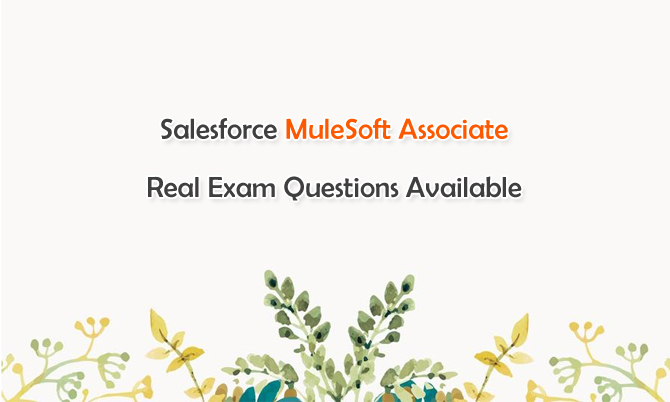The Salesforce Certified MuleSoft Associate credential is a certification designed for individuals who aspire to contribute effectively to a MuleSoft project team. This credential serves as a validation of their comprehensive understanding of core integration methodologies and API-led connectivity concepts, affirming their ability to implement these techniques in real-world scenarios. Obtaining this certification is not just about demonstrating one's proficiency in integration technologies. It is also a significant stepping stone towards a plethora of roles in the IT industry. It opens up opportunities for individuals to assume a variety of roles such as developers, architects, project managers, and IT operations professionals.

Candidates for this Salesforce Certified MuleSoft Associate certification should possess knowledge and skills in several crucial areas:
Integration Project Lifecycle: Understanding the roles, responsibilities, and phases of a typical integration project.
Essential Integration Concepts: Familiarity with terminology and concepts used by MuleSoft architects and developers.
Common Integration Challenges: Knowledge of fundamental integration use cases and the appropriate technologies to address them.
Technical Complexities: Awareness of technical complexities central to integration development.
Anypoint Platform Components: Understanding the components and benefits of the Anypoint Platform for system integration and API management.
The MuleSoft Associate exam comprises 40 multiple-choice questions and up to five non-scored questions, to be completed within 70 minutes. A passing score of 70% is required to achieve certification. The registration fee is USD 75, with a free retake option.
The MuleSoft Associate exam assesses candidates on the following objectives:
Integration Project Roles and Lifecycle (17%)
●Identify common reasons for IT integration project failures.
●Define the IT delivery gap and describe MuleSoft’s approach to addressing it.
●Describe API-led IT delivery models, emphasizing production and consumption.
●Outline common delivery methodologies and DevOps practices for integration projects.
●Understand the design, implementation, and management stages of MuleSoft’s API lifecycle.
Essential Integration Concepts (20%)
●Differentiate between IaaS, PaaS, and SaaS.
●Identify required virtualization, computing, and storage infrastructure.
●Classify common networking protocols and data formats (XML, YAML, JSON).
●Define API and enterprise system security concepts.
●Describe HTTP components enabling RESTful web services.
●Distinguish between various API types (RESTful, SOAP, AsyncAPI, GraphQL).
Common Integration Problems and Solutions (17%)
●Classify characteristics of common enterprise systems.
●Compare legacy and modern integration approaches.
●Identify integration use cases for complex business problems.
●Describe different integration technologies suitable for various scenarios.
Technical Complexities in Integration (18%)
●Explain interaction patterns (request-reply, one-way, multicast, etc.).
●Compare composition patterns (aggregation, orchestration, choreography).
●Emphasize the benefits of a design-first approach to API development.
●Discuss observability approaches, including logs, metrics, and tracing.
●Design MuleSoft applications using core connectors.
●Contrast cloud, hybrid, and on-premise deployment architectures.
Anypoint Platform for System Integration (18%)
●Identify primary components and benefits of Anypoint Platform.
●Describe popular Anypoint Connectors.
●Understand deployment options for Anypoint Platform.
●Recognize the development tools and languages for integration developers and DevOps teams.
●Classify reusable assets in Anypoint Exchange.
Anypoint Platform for API Management (10%)
●Identify components and benefits of Anypoint Platform for API management.
●Explain the goals of full lifecycle API development and Universal API Management (UAPIM).
●Compare API-led connectivity with other integration and API management approaches.
Preparation for the Salesforce Certified MuleSoft Associate Exam requires a blend of theoretical knowledge and practical experience. Here are some tips to help you prepare effectively:
Study the Exam Objectives: Familiarize yourself with the detailed objectives outlined above to understand the scope of the exam.
Hands-on Practice: Engage in practical exercises using the Anypoint Platform to reinforce your understanding of integration concepts and methodologies.
Official Training Courses: Consider enrolling in official MuleSoft training courses that provide in-depth coverage of the exam topics.
Real Exam Questions: Practice with MuleSoft Associate real exam questions from Testpassport to get a feel for the exam format and question types.
Community and Forums: Join MuleSoft community forums to discuss topics and clarify doubts with fellow aspirants and experts.
The Salesforce Certified MuleSoft Associate credential is a valuable asset for individuals aiming to excel in the field of integration and API management. By validating your knowledge of MuleSoft's core concepts and the Anypoint Platform, this certification can significantly enhance your career prospects and prepare you for various roles in integration projects. With thorough preparation and a clear understanding of the exam objectives, you can confidently navigate the Salesforce Certified MuleSoft Associate Exam and achieve certification.